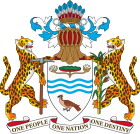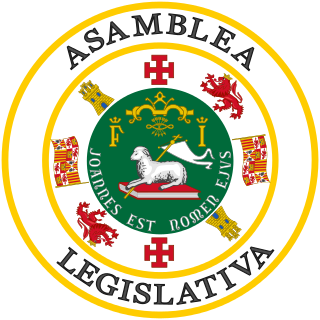 |
|---|
| Constitution |
The Senate was the upper house of the Legislature in British Guiana between 1961 and 1964.
 |
|---|
| Constitution |
The Senate was the upper house of the Legislature in British Guiana between 1961 and 1964.
A new constitution was promulgated on 18 July 1961, replacing the unicameral Legislative Council with the legislature. The new body consisted of a 13-member Senate and a 36-member Legislative Assembly. [1] The 13 members of the Senate were nominated, with eight nominated by the ruling party, three by the opposition and two by the Governor. [2] Of the 36 Legislative Assembly members, 35 were elected in single-member constituencies, and the elected MPs then elected a Speaker. [1]
Elections to the new Legislature were held on 21 August 1961, and both houses convened for the first time on 5 October 1961. In the Senate, Ashton Chase was elected President and Cyril Victor Too Chung Vice President. [1] The People's National Congress (PNC) were allocated two of the Senate seats reserved for the opposition, with one given to the United Force. However, the PNC claimed they should have been given all three seats, and its members attempted to block Governor Richard Luyt from entering the legislature on the day of its ceremonial opening on 6 October, requiring the police to remove them. [3]
Further constitutional amendments in 1964 scrapped the legislature, replacing it with a unicameral House of Assembly. The legislature was dissolved on 25 September 1964. [1]

The Westminster system, or Westminster model, is a type of parliamentary government that incorporates a series of procedures for operating a legislature, first developed in England. Key aspects of the system include an executive branch made up of members of the legislature, and that is responsible to the legislature; the presence of parliamentary opposition parties; and a ceremonial head of state who is separate from the head of government. The term derives from the Palace of Westminster, which has been the seat of the Westminster Parliament in England and later the United Kingdom since the 13th century. The Westminster system is often contrasted with the presidential system that originated in the United States, or with the semi-presidential system, based on the government of France.

A senate is a deliberative assembly, often the upper house or chamber of a bicameral legislature. The name comes from the ancient Roman Senate, so-called as an assembly of the senior and therefore considered wiser and more experienced members of the society or ruling class. However the Roman Senate was not the ancestor or predecessor of modern parliamentarism in any sense, because the Roman senate was not a de jure legislative body.

A member of parliament (MP) is the representative in parliament of the people who live in their electoral district. In many countries with bicameral parliaments, this term refers only to members of the lower house since upper house members often have a different title. The terms congressman/congresswoman or deputy are equivalent terms used in other jurisdictions. The term parliamentarian is also sometimes used for members of parliament, but this may also be used to refer to unelected government officials with specific roles in a parliament and other expert advisers on parliamentary procedure such as the Senate parliamentarian in the United States. The term is also used to the characteristic of performing the duties of a member of a legislature, for example: "The two party leaders often disagreed on issues, but both were excellent parliamentarians and cooperated to get many good things done."
Unicameralism is a type of legislature consisting of one house or assembly that legislates and votes as one. Unicameralism has become an increasingly common type of legislature, making up nearly 60% of all national legislatures and an even greater share of subnational legislatures.

The Parliament of the Republic of South Africa is South Africa's legislature; under the present Constitution of South Africa, the bicameral Parliament comprises a National Assembly and a National Council of Provinces. The current twenty-eighth Parliament was first convened on 14 June 2024.

The National Assembly is the legislature for Venezuela that was first elected in 2000. It is a unicameral body made up of a variable number of members, who were elected by a "universal, direct, personal, and secret" vote partly by direct election in state-based voting districts, and partly on a state-based party-list proportional representation system. The number of seats is constant, each state and the Capital district elected three representatives plus the result of dividing the state population by 1.1% of the total population of the country. Three seats are reserved for representatives of Venezuela's indigenous peoples and elected separately by all citizens, not just those with indigenous backgrounds. For the 2010 to 2015 the number of seats was 165. All deputies serve five-year terms. The National Assembly meets in the Federal Legislative Palace in Venezuela's capital, Caracas.
An upper house is one of two chambers of a bicameral legislature, the other chamber being the lower house. The house formally designated as the upper house is usually smaller and often has more restricted power than the lower house. A legislature composed of only one house is described as unicameral.

The Parliament of Pakistan is the supreme legislative body of the Islamic Republic of Pakistan. It is a bicameral federal legislature, composed of the President of Pakistan and two houses: the Senate and the National Assembly. The president, as head of the legislature, has the power to summon or prorogue either house of the Parliament. The president can dissolve the National Assembly, only on the Prime Minister's advice.

The Legislative Assembly of Puerto Rico is the territorial legislature of the Commonwealth of Puerto Rico, responsible for the legislative branch of the government of Puerto Rico. The Assembly is a bicameral legislature consisting of an upper house, the Senate normally composed of 27 senators, and the lower house, the House of Representatives normally consisting of 51 representatives. Eleven members of each house are elected at-large rather than from a specific legislative district with all members being elected for a four-year term without term limits.

Elections in Guyana take place within the framework of a multi-party representative democracy and a presidential system. The National Assembly is directly elected, with the nominee of the party or alliance that receives the most votes becoming President.

The Parliament of Zimbabwe is the bicameral legislature of Zimbabwe composed of the Senate and the National Assembly. The Senate is the upper house, and consists of 80 members, 60 of whom are elected by proportional representation from ten six-member constituencies corresponding to the country's provinces. Of the remaining 20 seats, 18 are reserved for chiefs, and two for people with disabilities. The National Assembly is the lower house, and consists of 280 members. Of these, 210 are elected from single-member constituencies. The remaining 70 seats are reserved women's and youth quotas: 60 for women; 10 for youth. These are elected by proportional representation from ten six-member and one-member constituencies respectively, corresponding to the country's provinces.

The Supreme Council is the unicameral parliament of the Kyrgyz Republic. It was known as the Supreme Soviet of the Kirghiz Soviet Socialist Republic until 1991.

The Constitution of the Democratic Socialist Republic of Sri Lanka has been the constitution of the island nation of Sri Lanka since its original promulgation by the National State Assembly on 7 September 1978. As of October 2022 it has been formally amended 21 times.

The Constitution of Guyana is the highest governing document in the Republic of Guyana. It came into effect on October 6, 1980, replacing the constitution enacted in 1966 upon its independence from the United Kingdom. The current Constitution of Guyana contains 12 chapters that are further divided into 232 articles. It also contains a preamble and an oath. Since its 1980 enactment, it has gone through multiple amendments.

The Tamil Nadu Legislative Assembly is the unicameral legislature of the Indian state of Tamil Nadu. It has a strength of 234 members, all of whom are democratically elected using the first-past-the-post system. The presiding officer of the Assembly is the Speaker. The term of the Assembly is five years, unless dissolved earlier.

General elections were held in British Guiana on 21 August 1961. The result was a victory for the People's Progressive Party, which won 20 of the 35 seats.

The Legislative Council was the legislature of British Guiana between 1928 and 1953 and again from 1954 until 1961.

The House of Assembly was the legislature of British Guiana in the 1950s and 1960s.

The Legislature was the parliament of British Guiana between 1961 and 1964. A bicameral body, it consisted of an appointed Senate and an elected Legislative Assembly.

The Legislative Assembly was the lower house of the Legislature in British Guiana between 1961 and 1964.